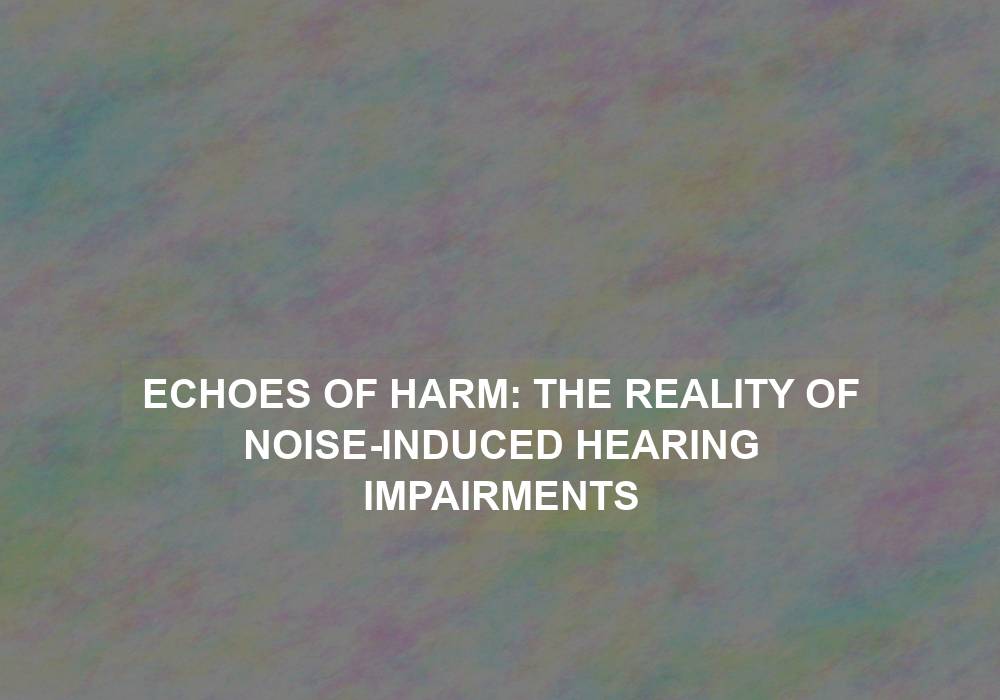Noise-induced hearing impairments have become a pressing concern in today’s fast-paced and increasingly noisy world. The constant exposure to loud sounds and excessive noise levels has led to a rise in individuals suffering from hearing loss and related problems. This article aims to shed light on the reality of noise-induced hearing impairments, their causes, effects, and preventive measures.
Understanding the Causes of Noise-Induced Hearing Impairments
Noise-induced hearing impairments occur when the delicate structures of the inner ear are damaged by excessive noise exposure. Prolonged exposure to loud noises above 85 decibels (dB) can cause irreversible damage to the sensory cells, known as hair cells, within the cochlea.
Common sources of noise that can lead to hearing impairments include:
-
Occupational Hazards: Certain professions expose individuals to high noise levels regularly. Construction workers, factory employees, musicians, and airport personnel are at a higher risk of developing noise-induced hearing impairments due to their constant exposure to loud machinery, music, and aircraft noise. Employers in these industries should prioritize providing adequate hearing protection and implementing noise control measures to safeguard their employees’ auditory health.
-
Recreational Activities: Participating in recreational activities such as listening to loud music, attending concerts, shooting firearms, or riding motorcycles without proper hearing protection can also contribute to noise-induced hearing impairments. It is crucial for individuals engaging in these activities to wear earplugs or earmuffs specifically designed to reduce noise exposure. Additionally, maintaining a safe distance from loudspeakers or using noise-canceling headphones can provide added protection.
-
Personal Audio Devices: The increased use of personal audio devices like smartphones and portable music players, especially when used with earphones or headphones at high volumes, can result in long-term damage to hearing. It is important to practice safe listening habits by keeping the volume at a moderate level and limiting the duration of exposure. The use of over-ear headphones instead of earphones can also help reduce the risk of noise-induced hearing impairments by providing better noise isolation.
The Effects of Noise-Induced Hearing Impairments
Noise-induced hearing impairments can have a significant impact on an individual’s quality of life. The severity of the impairment depends on factors such as the intensity and duration of noise exposure. Here are some common effects of noise-induced hearing impairments:
-
Communication Difficulties: Individuals with hearing impairments often struggle to understand conversations, especially in noisy environments. They may find it challenging to follow instructions, participate in group discussions, or engage in social interactions, leading to feelings of isolation and frustration. Implementing effective communication strategies, such as using visual cues or assistive listening devices, can help mitigate these difficulties and improve overall communication experiences.
-
Reduced Quality of Life: Hearing loss can affect an individual’s overall well-being. It may lead to decreased job performance, financial difficulties, and decreased social participation, ultimately impacting their overall quality of life. Seeking timely treatment, such as hearing aids or cochlear implants, can significantly improve communication abilities and enhance quality of life for individuals with noise-induced hearing impairments.
-
Cognitive Decline: Recent studies have shown a correlation between hearing loss and cognitive decline. The brain works harder to comprehend sounds when hearing is impaired, which can lead to mental fatigue and an increased risk of conditions like dementia and Alzheimer’s disease. Regular hearing screenings, coupled with appropriate interventions, can help identify and address hearing impairments early, potentially reducing the risk of cognitive decline.
Preventive Measures for Noise-Induced Hearing Impairments
Fortunately, there are several preventive measures individuals can take to protect themselves from noise-induced hearing impairments. By adopting these measures, individuals can minimize the risk of damage to their hearing and preserve their auditory health. Some key preventive strategies include:
-
Use Hearing Protection Devices: Wearing earplugs, earmuffs, or noise-canceling headphones in noisy environments or during recreational activities can significantly reduce the risk of noise-induced hearing impairments. These devices act as barriers to protect the ears from excessive noise exposure, preserving the delicate structures of the inner ear.
-
Limit Exposure to Loud Sounds: Avoid or limit exposure to excessively loud noises whenever possible. If you find yourself in a noisy environment, try to move away from the source of the noise or take regular breaks in quieter areas. Implementing quiet zones or designated rest areas in workplaces and public spaces can provide individuals with opportunities to rest their ears and minimize noise exposure.
-
Follow Workplace Safety Guidelines: If you work in a noisy environment, make sure to follow workplace safety guidelines and use the provided protective equipment. Employers should also ensure adequate noise control measures are in place to protect their employees’ hearing. Regular noise level monitoring and employee education programs can help create a safer work environment.
-
Practice Safe Listening Habits: When using personal audio devices, keep the volume at a moderate level and limit listening time. Opt for over-ear headphones instead of earphones, as they provide better noise isolation. Additionally, taking periodic breaks from listening to allow the ears to rest can help prevent long-term damage.
-
Educate and Spread Awareness: It’s crucial to educate others about the risks of noise-induced hearing impairments and promote awareness. Encourage friends, family, and colleagues to take necessary precautions and protect their hearing health. Organize workshops or seminars to disseminate information about the importance of hearing protection and safe listening practices in various settings.
Conclusion
Noise-induced hearing impairments are a growing concern in today’s noisy world. Understanding the causes, effects, and preventive measures is essential to protect our hearing and preserve our quality of life. By following the recommended preventive strategies and spreading awareness, we can ensure a healthier and quieter future where the echoes of harm are silenced, and our hearing remains intact.
